Glycogen
Glycogen is a complex carbohydrate that is primarily stored in the liver and muscles of animals, including humans. It serves as a readily mobilized storage form of glucose, which is important for maintaining blood glucose levels and providing energy during periods of high demand.
Structure of Glycogen
Glycogen is a highly branched polymer of glucose molecules. It is similar in structure to amylopectin, which is the major component of starch in plants. The branching of glycogen allows for rapid mobilization of glucose when energy is needed.
Synthesis and Breakdown
Glycogen synthesis, known as glycogenesis, occurs when glucose levels are high, such as after a meal. The enzyme glycogen synthase catalyzes the formation of glycogen from glucose molecules. On the other hand, glycogen breakdown, known as glycogenolysis, is stimulated when blood glucose levels drop. The enzyme glycogen phosphorylase breaks down glycogen into glucose-1-phosphate, which can then be converted to glucose for energy production.
Regulation of Glycogen Metabolism
Glycogen metabolism is tightly regulated by hormones such as insulin and glucagon. Insulin promotes glycogen synthesis and storage when blood glucose levels are high, while glucagon stimulates glycogen breakdown to release glucose into the bloodstream when blood glucose levels are low.
Role in Exercise
During exercise, glycogen stored in the muscles is an important source of energy. As muscle contractions increase, glycogen is broken down to provide glucose for ATP production, which is essential for muscle function.
Study Guide
- What is the primary storage site of glycogen in the body?
- Describe the structure of glycogen and its significance in energy mobilization.
- Explain the processes of glycogenesis and glycogenolysis.
- How is glycogen metabolism regulated by hormones?
- Discuss the role of glycogen in providing energy during exercise.
◂Biology Worksheets and Study Guides High School. Human biology I
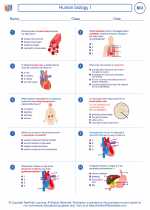
 Worksheet/Answer key
Worksheet/Answer key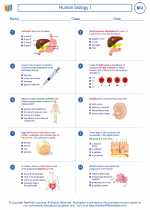
 Worksheet/Answer key
Worksheet/Answer key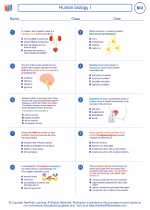
 Worksheet/Answer key
Worksheet/Answer key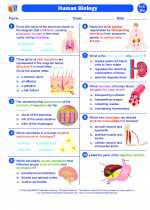
 Vocabulary/Answer key
Vocabulary/Answer key
 Vocabulary/Answer key
Vocabulary/Answer key
 Vocabulary/Answer key
Vocabulary/Answer key
 Vocabulary/Answer key
Vocabulary/Answer key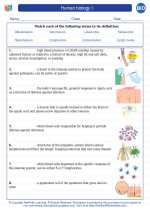
 Vocabulary/Answer key
Vocabulary/Answer key
 Vocabulary/Answer key
Vocabulary/Answer key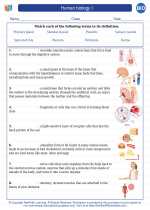
 Vocabulary/Answer key
Vocabulary/Answer key
